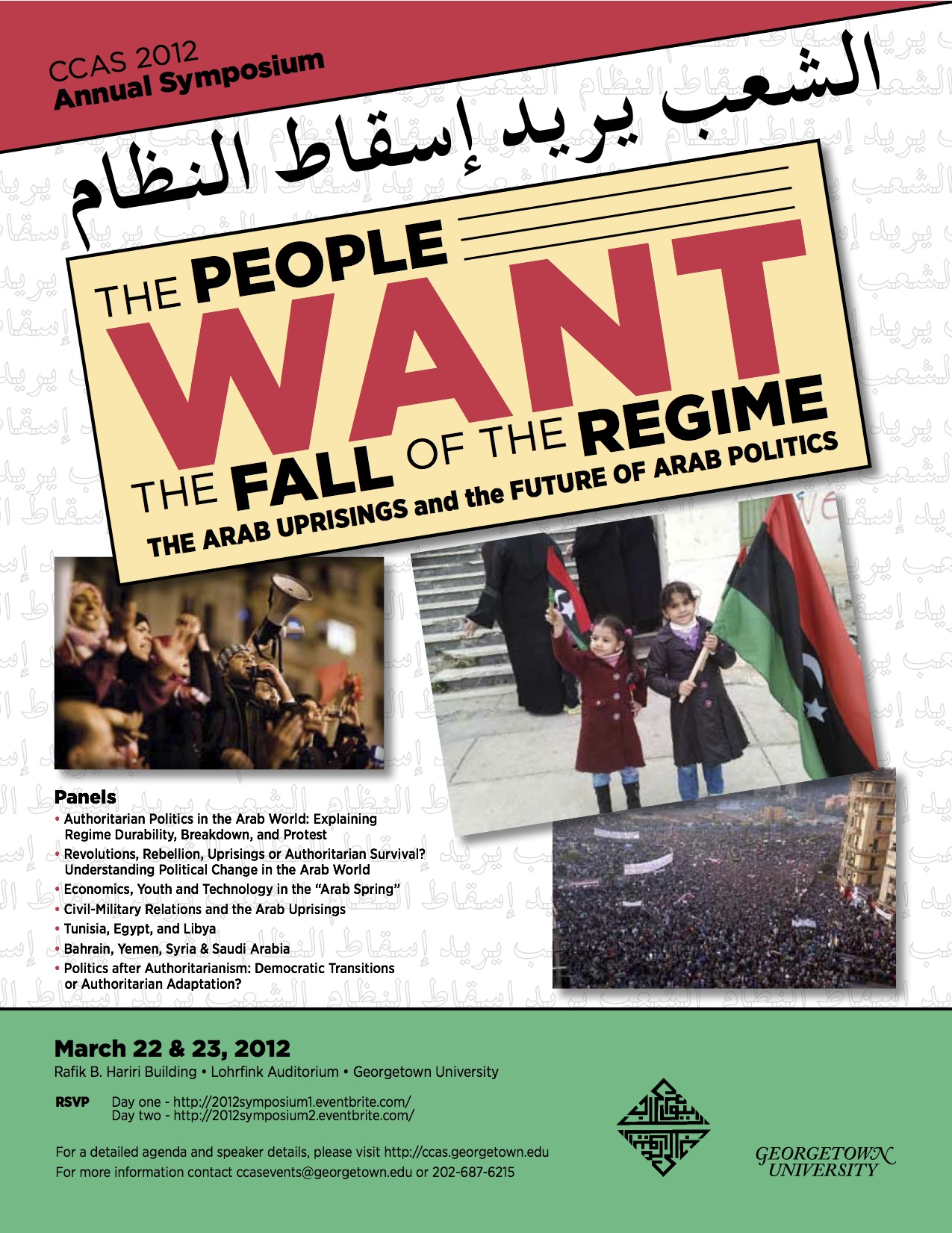The Center for Contemporary Arab Studies cordially invites you to attend
The 2012 CCAS Annual Symposum
The People Want the Fall of the Regime: The Arab Uprisings and the the Future of Arab Politics
The Arab world has witnessed unprecedented protests and popular mobilization since December 2010/January 2011. Across the region, millions of people have rallied to demand dignity and freedom, often in the face of violent repression. Al sha‘b urid isqat al nizam—“The People Want the Fall of the Regime”—has been the popular rallying cry. Uprisings in Tunisia, Egypt, Libya, and Yemen have already brought down four of the region’s longest-standing rulers. And significant protests have taken place from Morocco to Bahrain and continue in Syria, seriously threatening the Assad regime. No Arab state has been left untouched by the historic events unfolding in the region.
What explains the so-called “Arab Spring”? What are the underlying political, economic, and demographic causes of protest in these countries? Are the events taking place in the Arab world best understood as “revolutions,” with all that this term implies, or as some other form of political change? What role have Arab militaries played in these developments and how have the specific character of military-regime relations affected the process and outcomes of political change? Are Tunisia, Egypt, Libya, and Yemen—nations where autocrats have already been toppled—now undergoing “democratic transitions”? What is the state of politics in these societies after the “revolution”? And what is the current state of regime-opposition dynamics in Syria and other countries were major protests have taken place?
The 2012 Center for Contemporary Arab Studies Symposium will explore these questions more than one year after the beginning of the Arab uprisings. Seven expert panels will assess these events, discuss their historical significance, explore their underlying causes, and analyze what these dramatic developments mean for our understanding of Arab politics and for the future of the Arab world.
Agenda for Thursday, March 22, 2012
Conference Venue: Lohrfink Auditorium, Rafik B. Hariri Building, Georgetown University
8:30-9:00am
- Registration, coffee, and light breakfast
9:00-9:15am
- Welcoming Remarks: Osama Abi-Mershed, Georgetown University
- Opening Remarks: Samer S. Shehata, Georgetown University
9:15-11:00am (Panel 1) Authoritarian Politics in the Arab World: Explaining Regime Durability, Breakdown, and Protest
- Lisa Wedeen (University of Chicago): “Syria`s Uprising and Generational Change: Class, Ideology, and the Importance of Social Theory”
- Eva Bellin (Brandeis University): “Reconsidering the Robustness of Arab Authoritarianism in the Middle East: Lessons from the Arab Spring”
- Joseph Sassoon (Georgetown/Oxford University): “Durability of Authoritarian Regimes: the Role of Security Services and Informants”
- Discussant: Steven Heydeman (USIP)
11:00-11:15am Break
11:15am-12:45pm (Panel 2) Revolutions, Rebellion, Uprisings or Authoritarian Survival? Understanding Political Change in the Arab World
- Mohammed Bamyeh (University of Pittsburgh): "From Old Nationalism to New Patriotism: A Preliminary Sketch of the Ideology of the Arab Revolutions"
- Asli Bali (UCLA): “Uprisings and Intervention in the Arab World after 2011”
12:45-2pm Lunch
2:00-3:30pm (Panel 3) Economics, Youth and Technology in the “Arab Spring”
- Joel Beinin (Stanford University): "What have workers gained from Egypt’s January 25 ‘Revolution’?”
- Adel Iskandar (Georgetown University): “Are we all Khaled Said? Social Media, Dissidence, and Participatory Governance in Egypt”
- Marwan M. Kraidy (Univ. of Pennsylvania/American Univ. in Beirut): “Plato’s Digital Cave: The Hypermediation of the Arab Uprisings”
3:30-3:45pm Break
3:45-5:15pm (Panel 4) Civil-Military Relations in the Arab Uprisings
- Noureddine Jebnoun (Georgetown University): “In the Shadow of Power: Civil-Military Relations and the Tunisian Popular Revolution”
- Robert Springborg (Naval Postgraduate School): “Civil-Military Relations in the Wake of the Arab Uprisings: Arab Exceptionalism Redux”
- Discussant: Holger Albrecht (American University in Cairo/Georgetown University)
Agenda for Friday, March 23, 2012
Conference Venue: Lohrfink Auditorium, Rafik B. Hariri Building, Georgetown University
9:00-9:30am
- Registration, coffee and light breakfast
9:30-11:00am (Panel 5) Tunisia and Egypt
- Eric Gobe (Centre Jacques Berque/CNRS, Rabat, Morocco): “Lawyers and Revolution: Political Mobilization and Professional Power in Tunisia”
- Dina Bishara (George Washington University): "Mismanaging Dissent: The Unintended Consequences of Regime Response to Labor Protests in Egypt 2006-2011"
- Elliot Colla (Georgetown University): "The People Want?: Poetry, Slogan and Revolutionary Repertoire in Egypt."
11:00-11:15am Break
11:15am-1:00pm (Panel 6) Yemen, Syria & the Gulf States
- Stacey Philbrick Yadav (Hobart and William Smith Colleges): "(Dis)Unity in Difference? Opposition Responses to the GCC Process in Yemen"
- Bassam Haddad (George Mason/Georgetown University): "The Limits of Authoritarian Resilience in Syria"
- Gerd Nonneman (Georgetown University SFS-Qatar): "The GCC and the Arab Spring: Omnibalancing and Regime Quirks in Riyadh and Doha"
- Discussant: Joost Hiltermann, (International Crisis Group)
1:00-2:15pm Lunch
2:15-3:45pm (Panel 7) Politics after Authoritarianism: Democratic Transitions or Authoritarian Adaptation?
- Christopher Alexander (Davidson College): “Tunisia: Reflections on Politics in the Early Second Republic”
- Thomas Husken (Facheinhet Ethnologie, Universitat Bayreuth): “Political Culture and the Revolution in the Cyrenaica of Libya”
- Heba Raouf (Cairo University): “The Republic vs. the State : Reflections on the Egyptian Revolution”
- Discussant: Daniel Brumberg (Georgetown University)
3:45- 4:00pm
- Closing Remarks: Samer S. Shehata (Georgetown University)
-------------------------------------------------
RSVP for March 22 program here.
RSVP for March 23 program here.
It is not necessary to attend all panels, but please RSVP if you plan to attend at least one.
Contact:
Marina Krikorian
Public Affairs Coordinator
Phone: 202-687-6215
Email: ccasevents@georgetown.edu
